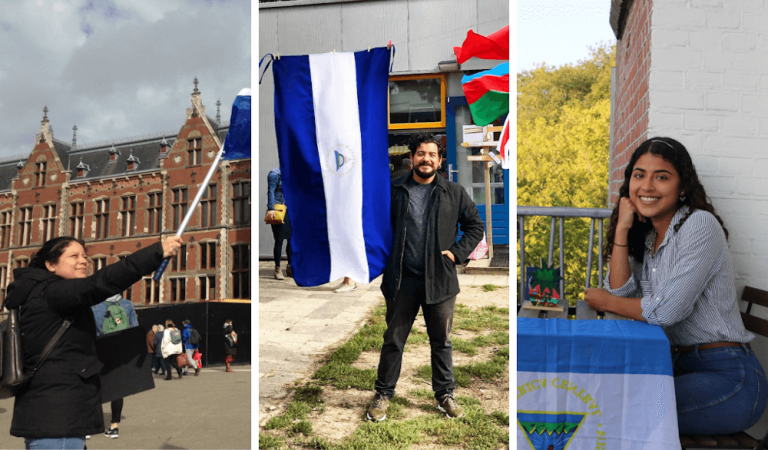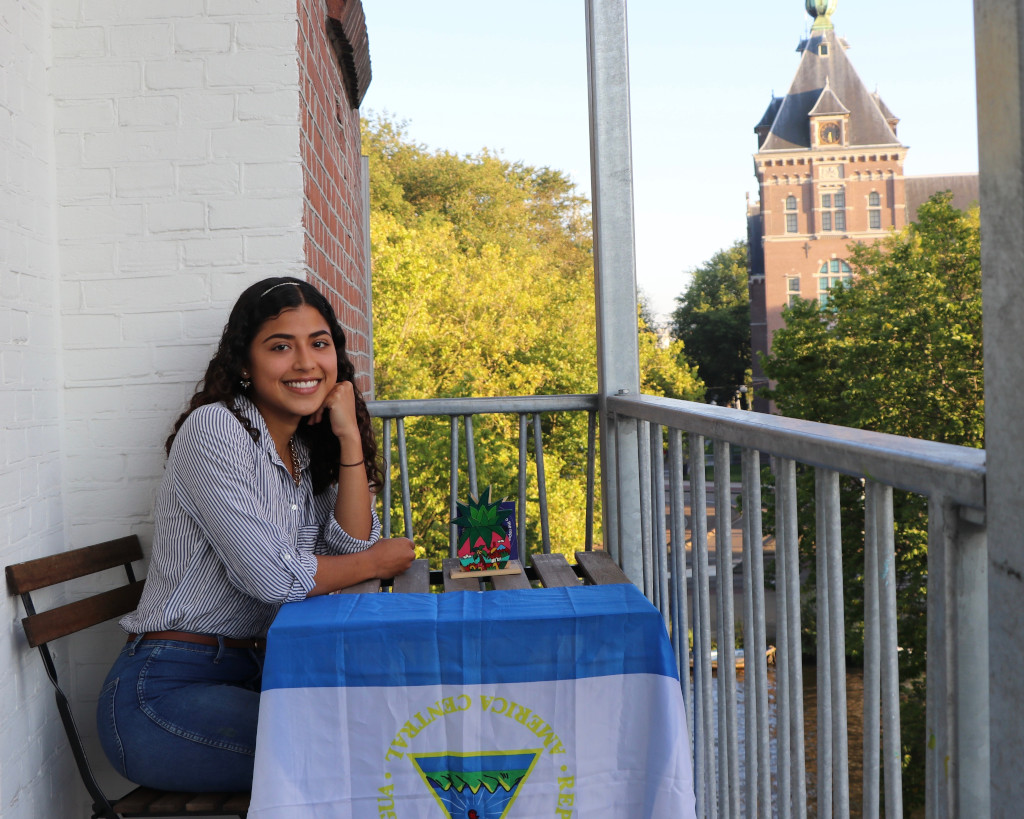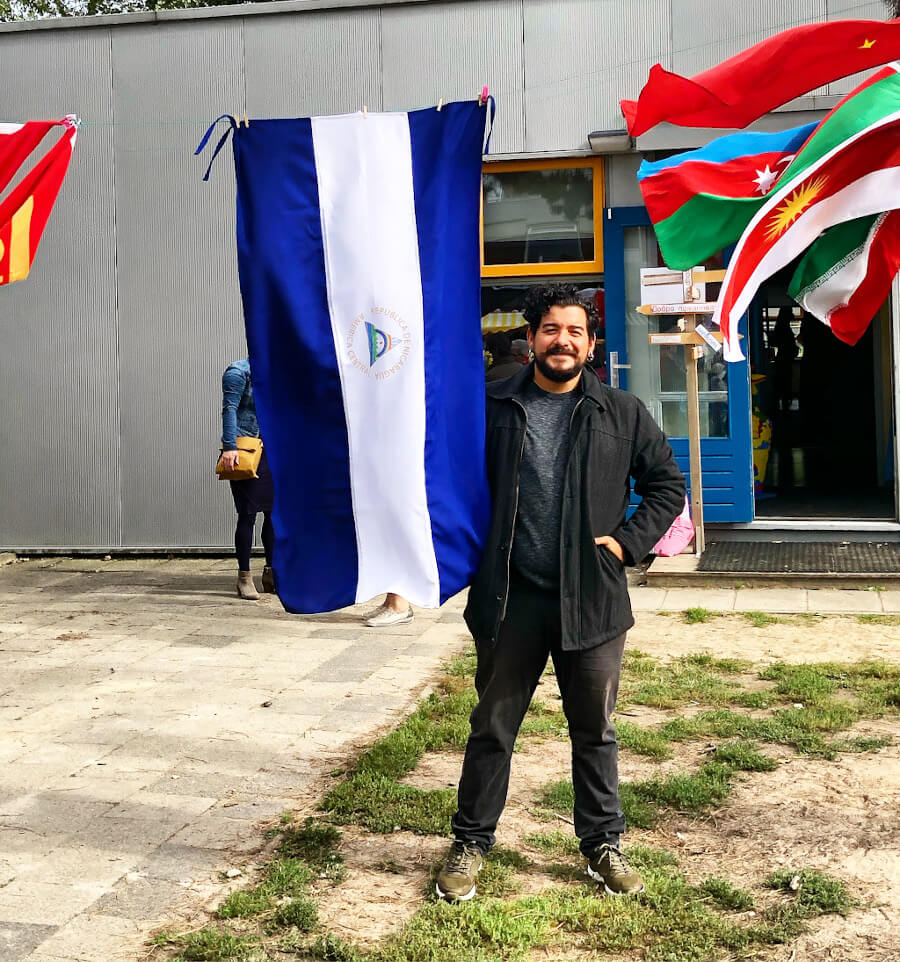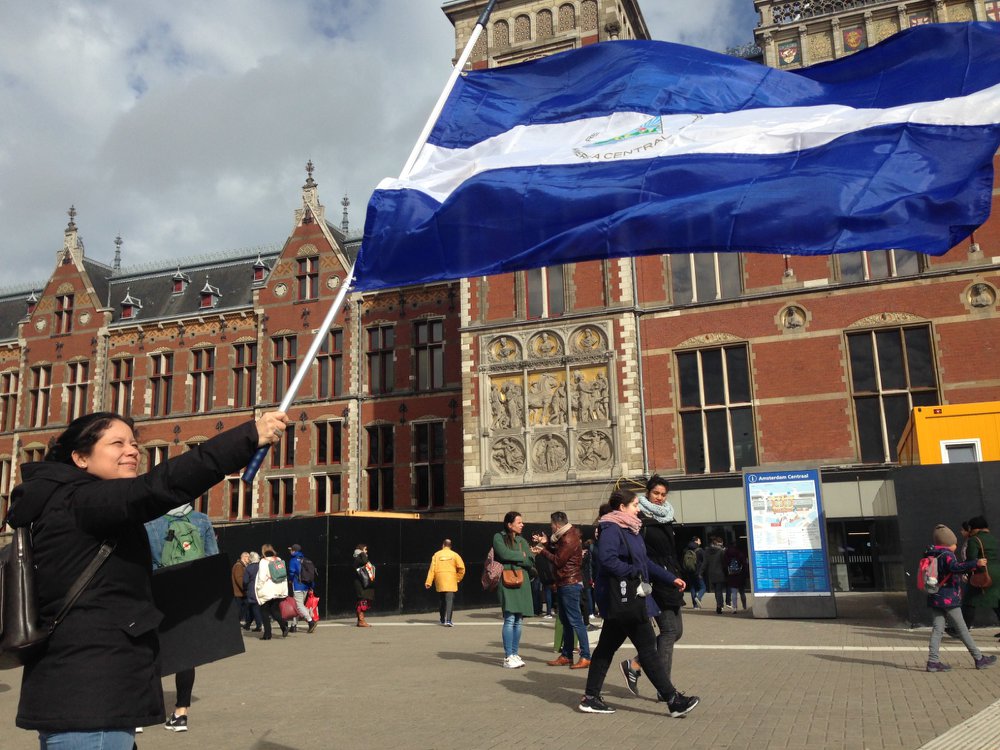25 de septiembre 2020

The Return of the Military

PUBLICIDAD 1M
PUBLICIDAD 4D
PUBLICIDAD 5D
More than 100,000 Nicaraguans left their country due to the political crisis. Three of them talked with us about their new lives in The Netherlands

Five months before the Nicaraguan political crisis broke out, Nathalia Martínez bought a ticket to fly to The Netherlands. She had just started her thesis for completing a degree in Architecture in a Nicaraguan public university and was spending time with her friends and working as a manager at a call center. Her trip was meant to be a vacation to visit her boyfriend and to celebrate that she was almost done studying.
When the protests against the Ortega-Murillo regime started in April that year, Nathalia became fully immersed in supporting the civil resistance and decided to set up a collection center to provide food and medicine for protesters at her house in Managua. Things escalated quickly, with the government prohibiting all forms of demonstrations.
Due to her involvement in the protests, she became a target of the National Police. Officers started persecuting her and surveilling her parent’s house. Eventually, she had to hide in security homes. The situation got so difficult and scary that the only way out was to use the flight ticket she had previously bought.
The Netherlands was just a place to visit, but it then became a safe place to wait while things in Nicaragua settled down. That never happened, so eventually, it also became the place that would welcome her as a political refugee.

Nathalia Martínez has gotten her residence permit and will start studying again. Foto: Ana Maria Sampson | Confidencial
Nathalia is one of the more than 100,000 Nicaraguan citizens who fled the country because of the political crisis. The United Nations estimates that about 9,000 of them moved to Europe and approximately 80 applied for political asylum in The Netherlands.
The statistical data of the Immigration and Naturalization Service (IND) — an institution that assesses applications from foreign nationals who want to live in The Netherlands — shows that Nicaraguans did not apply for political asylum until 2018. Applications usually came from citizens of other countries, such as Syria, Eritrea, Iran, Turkey, and other Middle Eastern nations.
Applying for political asylum is, possibly, the most difficult decision Nathalia has made in her life. She had no idea that she would not return to her home country. She had not planned it, as many others may have consciously done.
During the waiting time before being granted her residency permit as a political refugee, Nathalia found herself with “one foot in Nicaragua, and the other foot in The Netherlands. One step between life and death”, a feeling she spent a lot of time coming to terms with. In many ways, she held back from building a new life out of fear of being denied asylum.
Nathalia acknowledges that the process of applying for asylum is long, emotional, and psychologically heavy. It is tiring and it requires a lot of patience. “They moved me (from one center to another) four or five times, and your quality of life depends on where they send you. I went from centers that were like small family apartments and it was all quiet, to places where I was scared to go to the bathroom.”
In her new country of residence, everything from public transport to payment methods is different from what she was used to in Nicaragua. “It took me a lot (of time) to get used to the weather, to the food, and to be able to express myself in the way I express myself with other Nicaraguans ... People here are more serious. They tell you: 'Don't give me more details, go to the point,” she explains.
Although it took some time to get used to a new culture and way of life, there have been positive experiences about moving to The Netherlands. “I like that they know how to mix everything here, from the city with nature to people with different ideologies. It’s incredible. I don’t know what I like most about this country,” she says, and then jokingly adds “except for the food”.
The Architecture student was finally interviewed by the Dutch authorities a year and a half after formally applying for political asylum. Three weeks after that interview, she was granted a residency permit, which allows her to study again.
Despite having studied Architecture for four years, she will have to start all over again. But Nathalia feels okay about it because she will learn more in a Dutch university than what she did in Nicaragua.
While she waits for her studies to begin, she is working as an activist, collecting donations, organizing events, and raising awareness about the situation of her home country. Recently, she became a project manager at The Hague Peace Projects. This has allowed her to send donations to Nicaraguan exiles who live in Costa Rica and Panama.
Looking back on the person she was before obtaining the refugee status, she sees a different woman. “Now, a flower makes me smile,” she says. “If this whole process had turned out badly, if my departure from Nicaragua had turned out badly, if they had stopped me, I would not have seen the light of day. I would be locked up in prison somewhere (...) I can breathe now, go outside, walk. I am in a country where I am safe. I am just grateful for it."

Alberto has met other asylum seekers in The Netherlands. Photo: Courtesy | Confidencial
When the political crisis of Nicaragua forced Alberto Fernández and his family to leave, Honduras was the first country that could host them. The event planning company that Alberto worked for had plans of expanding to Honduras. There had been some concerns due to the insecurity of the country, but organizing events in Nicaragua was no longer a viable option, so Alberto and a family member began to lay the groundwork for the company to start up North.
Until April 2018, Alberto had dedicated most of his life to graphic design. He had also set up a company for designing and developing apps and software together with a couple of friends and was working as a manager for the design department of the aforementioned event planning company.
But when the protests against the Ortega-Murillo regime started, he joined thousands of Nicaraguans who were demanding a change in power. He collected food and medicine for university students who had occupied their campuses as a pressure strategy against the government and used his car to help people get to safe places when police officers and paramilitaries attacked civilians. He also participated in several marches.
Although Alberto was careful to cover his face and avoided being photographed, an image of him ended up on social media, and shortly after, a video accusing him of supposedly perpetrating various crimes began circulating. He was at the movies the first time he saw it, completely unaware of what was happening.
“I got goosebumps (...) It said that I had killed people,” he recalls. At that moment, he thought the threats were getting too close. “When there are videos it is because, supposedly, they (the regime) have evidence and they are pointing the finger at you, that you have committed a quite serious crime.”
Alberto realized that he was already under surveillance, and the accusations implied that his family could also be in danger. Therefore, he decided to spend a few nights at his in-laws to see if things settled down, but men on motorcycles parked outside of that house as well. They bought tickets to Honduras for the next day.
After leaving, the hope of going back to Nicaragua remained. They expected it to be temporary, and that if the situation at home improved, Alberto’s relative would continue organizing events in Honduras, and the family would move back home. But after a year, the threats followed them to their new country of residence:
“We know where you are. We know what type of car you drive. You drive a black car. We know you like going to the movies,” said one of the messages he received via social networks.
News began to surface that Nicaraguans who had fled to Honduras and taken refuge near the border were being tracked down and killed. It was then that Alberto’s family began to research and evaluate their options. They sold their belongings, and with that money, they bought tickets to The Netherlands.
When they applied for asylum in 2019, the Dutch authorities made them feel comfortable and gave them the feeling that they would be okay. They weren’t afraid they would be sent back to Nicaragua. However, he describes arriving at the refugee transition camp — before being relocated to a permanent refugee camp — as “a brutal reality shock”.
Due to the coronavirus pandemic, the process of applying for asylum in The Netherlands is taking longer. Usually, after six months, refugees get their BSN number, a formal registration number which allows them to start working part-time. But even after a year of arriving in the country, Alberto and his family are still waiting for this document.
The refugee camp where Alberto and his family are currently located in a repurposed military base. He says that the most difficult part about moving to The Netherlands is the winter because it doesn’t stop raining and the family has to spend most of their time indoors in the small room they have been placed. But besides the harsh weather, life in The Netherlands has included a few surprises.
“What surprised me the most was going to the supermarket, and seeing two girls on bicycles, who were about 8 years old, alone, coming from school. We are talking about 5 kilometers, by bike, alone. And I thought, when, in Nicaragua, and in Honduras, and in any other country in Central America, are girls going to be able to do that, you know? That did leave me in shock, how scary!”
As a refugee seeker, Alberto has had the chance to connect with people from different backgrounds and cultures. Muslims are one of them. “People cook very well here, and sometimes they knock on your door to offer you food so that you can try what their food is like, especially when they celebrate the end of Ramadan”, he says.
Alberto has begun to cook “gallopinto”, a traditional meal that many Nicaraguans miss while living abroad. The first time he made it, along with vigoron and tortillas, was at the refugee camp. Food makes him feel united with his country and other Nicaraguan refugees. They speak daily on a group chat, where they also share news and support one another when feeling sad.
Living in exile has been life-changing for Alberto. “It puts your feet on the ground. It makes you see reality and connect to people that you never thought you would connect with. I think this makes you more humane,” he explains.

Loanny Picado protesting against the Ortega regime in Amsterdam. Photo: Courtesy | SOS Nicaragua-Holanda
In Nicaragua, Loanny Picado was noted for her work in sports journalism and football commentary, becoming the first Nicaraguan woman to cover the World Cup in 2010, and the Eurocup, among other important sports events. In April of 2018, when the political crisis broke out, Loanny was about to leave for Russia to cover the World Cup but chose to cancel her trip.
Witnessing the crisis unfold and escalate around her, and the violent reaction of the Sandinista government, she felt she needed to do more. Loanny participated in the demonstrations against the Ortega-Murillo regime and supported students who were protesting inside universities by bringing them food and medical supplies, and helping them hide from police officers and paramilitary groups.
As a consequence, she began receiving death threats because of this kind of involvement, but the moment when fear truly set in was after she got an email which included photographs of her and her son, taken as she was leaving her home. Loanny remembers thinking about the children that died along with their family, in a fire that, according to witnesses, was started by paramilitary forces and police officers loyal to the regime, in the Carlos Marx neighborhood of Managua.
Fearing for the worst, Loanny called her husband, who is a Dutch citizen and was already in The Netherlands with their daughter, and told him about the threats and the pictures. Without much of a plan, and unsure if she would have to apply for asylum, the family decided it was best for them to go to The Netherlands, and figure out what to do from there.
At Managua’s International Airport, a customs officer asked questions about her son's Dutch nationality, and Loanny was told to wait while the officer left for 30 minutes with her passport. She was asked to come into a separate room, when her father, who had worked at the airport for 30 years, said that he would go speak to them. When the customs officer handed Loanny’s passport, he said: “Thank your dad. At least he’s not a traitor.”
Before that trip, Loanny had plans of moving to The Netherlands but in a completely different way. She wanted to learn Dutch first and be able to go visit her parents in Nicaragua as soon as she had the legal status to do so. Months later, she would find out it wouldn’t be possible to see her dad again, because he would die due to the Coronavirus.
Two weeks after arriving in her husband’s native country, Loanny visited the Immigration and Naturalization Service (IND). She brought her marriage certificate, evidence of the threats she had received in Nicaragua, and her children.
The IND officer seemed to sympathize with her case, and told her that instead of applying for asylum, what she needed was to apply for “family reunification”. She received a provisional visa, and eventually her residence permit.
Living in The Netherlands has implied a lot of changes. “In Nicaragua, you go outside and talk to your neighbor, and even if your neighbor likes to gossip, at least you see his or her face. I do not see anyone’s face here. Life is very closed off. That’s hard,” she acknowledges.
Loanny believes that one should never stop studying and learning. Recently, she was granted a scholarship at Ajax Coaching Academy, where she is currently studying to become a football coach. At the same time, she is working part-time as a receptionist at a hotel, which allows her to financially support her mother, who lives in Nicaragua.
In the future, she aspires to work as a commentator and dedicate herself to journalism. Although she says that writing in Dutch will be difficult, she is now able to speak the language. She would like to work on the radio at some point. Sports are her passion, after all. “When I go to the stadium, I am myself,” she says.
PUBLICIDAD 3M
PUBLICIDAD 3D